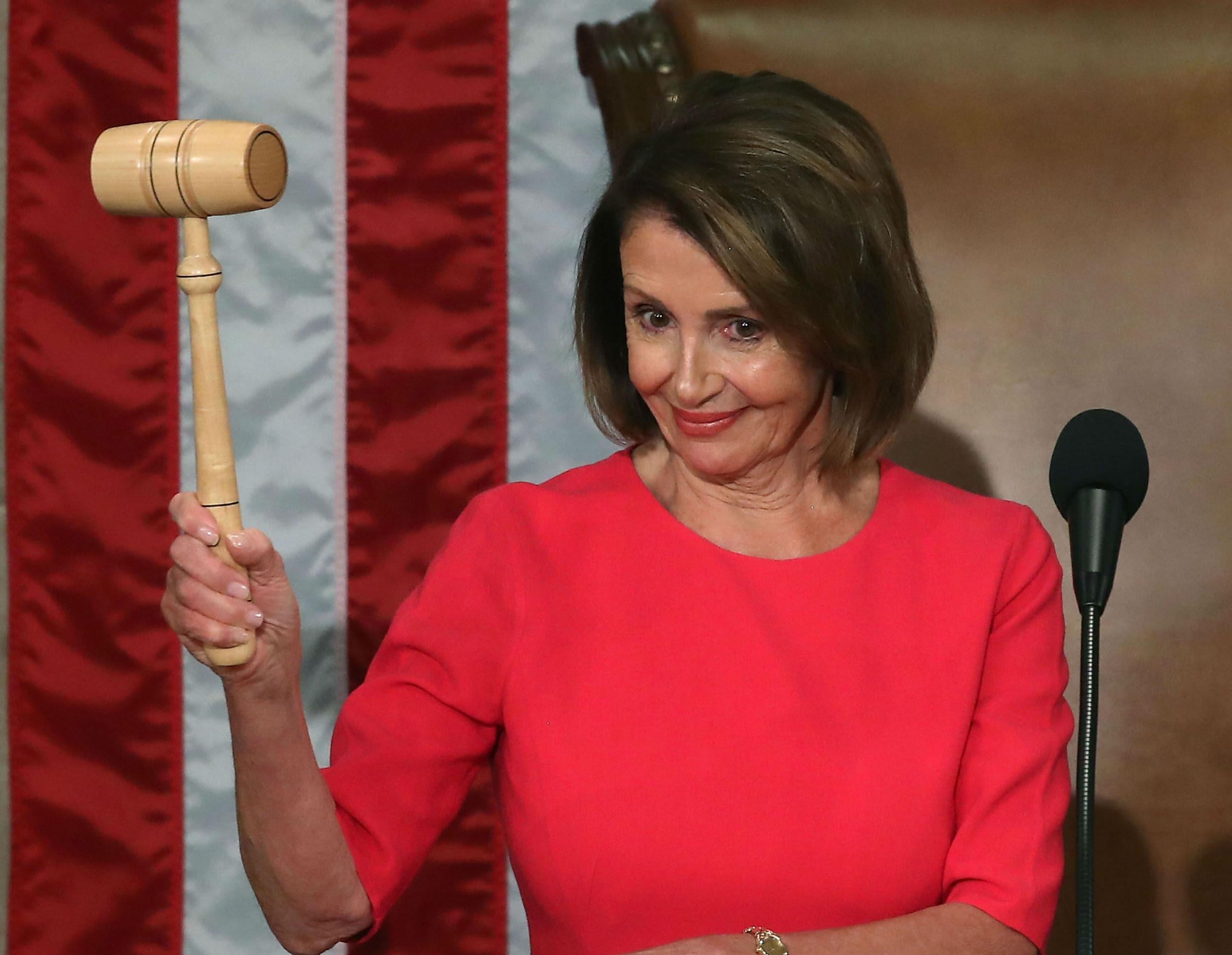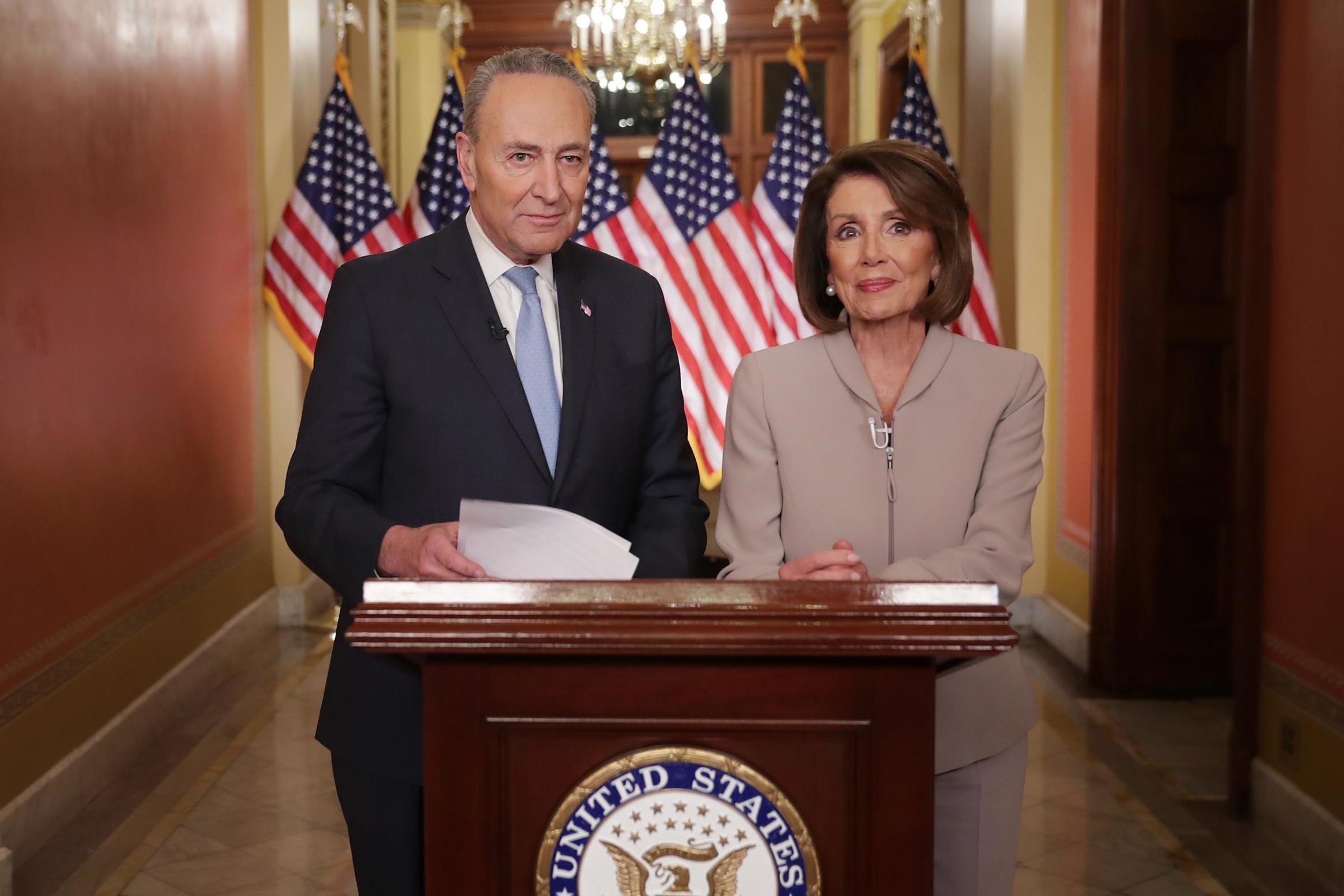Nancy Pelosi: How the veteran House speaker became the face of the revitalised resistance against Trump
America's most-powerful woman defied odds to lead chamber for second time and stood firm against president's demands for border wall funding during drawn-out shutdown
Your support helps us to tell the story
From reproductive rights to climate change to Big Tech, The Independent is on the ground when the story is developing. Whether it's investigating the financials of Elon Musk's pro-Trump PAC or producing our latest documentary, 'The A Word', which shines a light on the American women fighting for reproductive rights, we know how important it is to parse out the facts from the messaging.
At such a critical moment in US history, we need reporters on the ground. Your donation allows us to keep sending journalists to speak to both sides of the story.
The Independent is trusted by Americans across the entire political spectrum. And unlike many other quality news outlets, we choose not to lock Americans out of our reporting and analysis with paywalls. We believe quality journalism should be available to everyone, paid for by those who can afford it.
Your support makes all the difference.Since returning as speaker of the House of Representatives in January, Nancy Pelosi has emerged as the face of a revitalised resistance movement against Donald Trump.
Once written-off, the California Democrat, 78, now finds herself the third-most powerful politician in America after a “blue wave” saw her party win back the House majority during the November midterms.
She and Senate minority leader Chuck Schumer have already capitalised on their newfound advantage by standing firm to block the president’s demand for $5.7bn in federal funding to build his much-touted Mexico border wall.
The Democratic leaders held out for 35 days during the stand-off – the longest US government shutdown in history, beginning before Christmas and running well into the new year – forcing President Trump to blink first and back down, a retreat that will have pained him personally.
All eyes were on Ms Pelosi during the president’s delayed State of the Union address, waiting keenly for her reactions as he inevitably bragged about his administration’s legislative achievements, took credit for an “economic miracle” and stressed the need for the wall to combat the southern immigration crisis he insists poses a growing danger.
Her seemingly sarcastic applause at the conclusion was the moment commentators were waiting for and quickly became a meme, just as her exit from the White House in a red winter coat and sunglasses had in December.
Or, for that matter, her appearance on TV to rebut the president’s scaremongering early January broadcast from the Oval Office, appearing side-by-side with Mr Schumer like concerned parents after a curfew had passed or the dour rural siblings of Grant Wood’s American Gothic (1930).
Christine Pelosi, one of the speaker’s five children, joked on Twitter that the State of the Union clap took her back to her teenage years. President Trump might well have felt similarly.
Born in Baltimore, Maryland, in March 1940, Nancy Pelosi is the daughter of activist Annunciata Lombardi and Thomas “Big Tommy” D’Alesandro Jr, a congressman and later the port city’s mayor.
Acquainted with the Democratic political machine from an early age, Pelosi had a role in the family business as a teenager, helping at her father’s campaign events and answering eight separate phone lines on his behalf. Her brother, Thomas D’Alesandro III, would in turn sport Baltimore’s mayoral chains of office.
She attended John F Kennedy’s inauguration in January 1961 and graduated from the Catholic all-girls high school the Institute of Notre Dame a year later. Before graduating in political science from Trinity College, Washington, she interned with Maryland Senator Daniel Brewster.
She married financier Paul Pelosi in September 1963 at Baltimore’s Cathedral of Mary Our Queen. The couple moved first to Manhattan, then to San Francisco where they settled, Nancy initially a stay at home mother who had five children in six years.

By the early 1970s, she returned to politics after befriending California congressman Phillip Burton, working her way up the Democratic Party ranks. In 1976, she helped California governor Jerry Brown win the Maryland primary during an unsuccessful presidential run and was herself elected as the Democratic National Committee member for California, a position she would hold for 20 years. She was chair of the California Democratic Party between 1981 and 1983.
That year, Phillip Burton passed away and was succeeded by his wife Sala. She in turn fell ill and decided not to seek re-election in 1988, designating Ms Pelosi as her successor.
When Sala Burton died one month into her second term, Ms Pelosi won the special election to replace her and became the 5th District’s new congresswoman. She was one of just 24 women in the 435-seat chamber at the time.
In the House of Representatives, she served on the Appropriations and Intelligence committees in the 1990s, campaigning for greater AIDS research funding and for a San Francisco military base abandoned in 1994 to be turned into a national park. She succeeded and the Presido near the the Golden Gate Bridge and San Francisco Bay was opened to the public in 1996.
She was elected House minority whip in 2001, the first woman to hold the post, beating Steny Hoyer, an old contemporary from her intern days. A year later she became her party’s minority leader when Dick Gephardt of Missouri stepped down, emerging as an outspoken opponent of George W Bush’s War on Terror.

This stood her in good stead in 2006 when the Democrats won back their majority after 12 years in the midterms. She was duly elected the first female speaker of the House in American history on 4 January 2007. She was also the first Italian-American and first California speaker.
In accepting the gavel, she spoke of her generation having broken “the marble ceiling” for their daughters and granddaughters, for whom “the sky is the limit”.
Unfortunately for herself, the triumph would be short lived, the Democrats surrendering their advantage just four years later.
Her tenure coincided with the 2008 economic collapse and her chamber pushed through a $840bn stimulus package and legislation backing financial reform and outlawing gender discrimination in pay.
She also fought tirelessly for President Obama’s Affordable Care Act reforming healthcare, reportedly holding countless meetings and phone calls day and night to secure a “yes”. In doing so, she became a focal point for Republican outrage and negative campaigning thereafter, making her return to the speaker’s chair after being unseated in 2011 look entirely unlikely.
Close observers credit her subsequent renaissance to a tenacious work ethic and her skill as a fundraiser and organiser. She is said to get up at 5.30am every morning.
Her return as speaker came with one major concession, agreeing to eight-year term limits for members of the Democratic leadership. She has said she regards herself as a “bridge” to the next generation of party leaders at an exciting moment in which 89 of the 235 Democratic members of Congress are women. The fact was celebrated when they all wore white in solidarity with the suffragettes at the State of the Union.
“This House will be for the people,” she promised as she was sworn-in for a second time on 3 January 2019.
Pointedly, she also quoted Ronald Reagan’s final speech as president: “If we ever close the door to new Americans, our leadership role in the world will soon be lost.”
Perhaps her most scorching burn of recent days came when she was asked by a reporter whether Mr Trump had denied her the use of a military plane to take a congressional delegation to Afghanistan as an act of revenge after she had suggested he postpone the State of the Union.
“I don’t think the president would be that petty, do you?”

Join our commenting forum
Join thought-provoking conversations, follow other Independent readers and see their replies
Comments